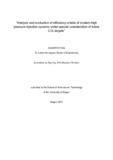Citation link:
http://dx.doi.org/10.25819/ubsi/10182Files in This Item:
| File | Description | Size | Format | |
|---|---|---|---|---|
| Dissertation_Stephan_Revidat.pdf | 16.92 MB | Adobe PDF |  View/Open |
| Dokument Type: | Doctoral Thesis | metadata.dc.title: | Analysis and evaluation of efficiency criteria of modern high pressure injection systems under special consideration of future CO2 targets | Other Titles: | Analyse und Beurteilung der Effizienzkriterien moderner Hochdruckeinspritzsysteme unter besonderer Berücksichtigung zukünftiger CO2 Ziele | Authors: | Revidat, Stephan | Institute: | Fakultät IV - Naturwissenschaftlich-Technische Fakultät | Free keywords: | Alternativer Kraftstoff, Hochdrucksystem, Fuel, Efficiency, Injection, Combustion engine, High pressure system, Alternative fuel, High pressure pump | Dewey Decimal Classification: | 620 Ingenieurwissenschaften und zugeordnete Tätigkeiten | GHBS-Clases: | XNR | Issue Date: | 2021 | Publish Date: | 2022 | Series/Report no.: | Schriftenreihe der Lehrstühle für Strömungsmechanik und technische Thermodynamik | Abstract: | „The future mobility will be electrified“– a phrase which has a significant impact on last year’s development. Indeed, the steps to a sustainable society requires not only the application of novel high power battery technologies, furthermore will combustion engines play an important role to achieve this sophisticated target. Due to its high complexity, an infrastructure based on an electric energy only supply is in many locations not applicable. Thus, synthetic fuel solutions have to be applied as an alternative sustainable energy source. As a consequence, a huge variety of fuels may be brought into local markets with their own impact on the combustion engine. The mandatory change of the combustion engine requires more than friction reduction, but also novel combustion approaches as well as the application of novel fuels. Herein, the fuel injection system acts as interface between the fuel and the mechanical engine operation. Nevertheless, this system suffers typically in its operation by its low total efficiency of ~15%. Therefore, optimization has shown that CO2 emission benefits of up to 5 g/km in cycles are possible. „Die Mobilität der Zukunft fährt elektrisch“ – ein Satz, der die vergangenen Jahre geprägt hat. Der Schritt zu einer regenerativen Verkehrswirtschaft erfordert, aber global nicht nur den Einsatz von Batterien, sondern wird auch mittelfristig den Verbrennungsmotor benötigen. Die Komplexität einer rein elektrisch basierten Infrastruktur ist an vielen Orten nicht realisierbar, daher müssen synthetische Kraftstoffe als Alternative angewendet werden. Daraus resultiert jedoch ein Flickenteppich verschiedener Kraftstoffe, die unterschiedliche Einflüsse auf den Motor haben. Der notwendige Wandel des Verbrennungsmotors als mittelfristige Antriebslösung bedarf nicht nur „klassischer“ Optimierungen - wie Reibungsreduktion - sondern neuer Brennverfahren oder die Verwendung neuer künstlicher Kraftstoffe. Das Kraftstoffsystem fungiert hierbei als Bindeglied zwischen einem neuen Kraftstoff und dem Motor. Optimierungen in diesem System bewirken, aufgrund des niedrigen Gesamtwirkungsgrades von im Mittel 15%, signifikante CO2 Emissionsverringerungen von bis zu 5 g/km im NEDC Zyklus. |
DOI: | http://dx.doi.org/10.25819/ubsi/10182 | URN: | urn:nbn:de:hbz:467-22716 | URI: | https://dspace.ub.uni-siegen.de/handle/ubsi/2271 | License: | http://creativecommons.org/publicdomain/zero/1.0/ |
| Appears in Collections: | Hochschulschriften |
This item is protected by original copyright |
Page view(s)
322
checked on Mar 10, 2025
Download(s)
72
checked on Mar 10, 2025
Google ScholarTM
Check
Altmetric
This item is licensed under a Creative Commons License


